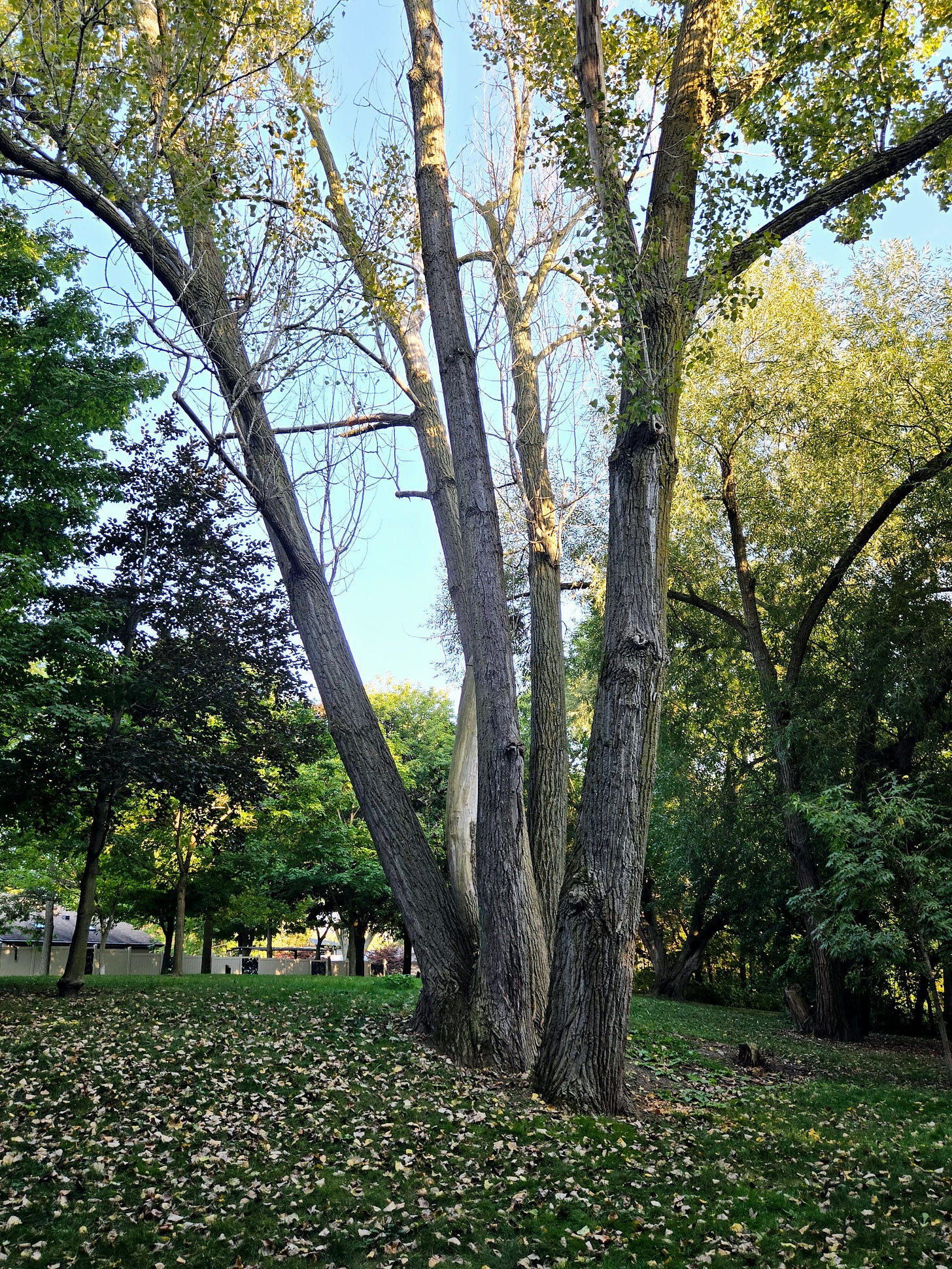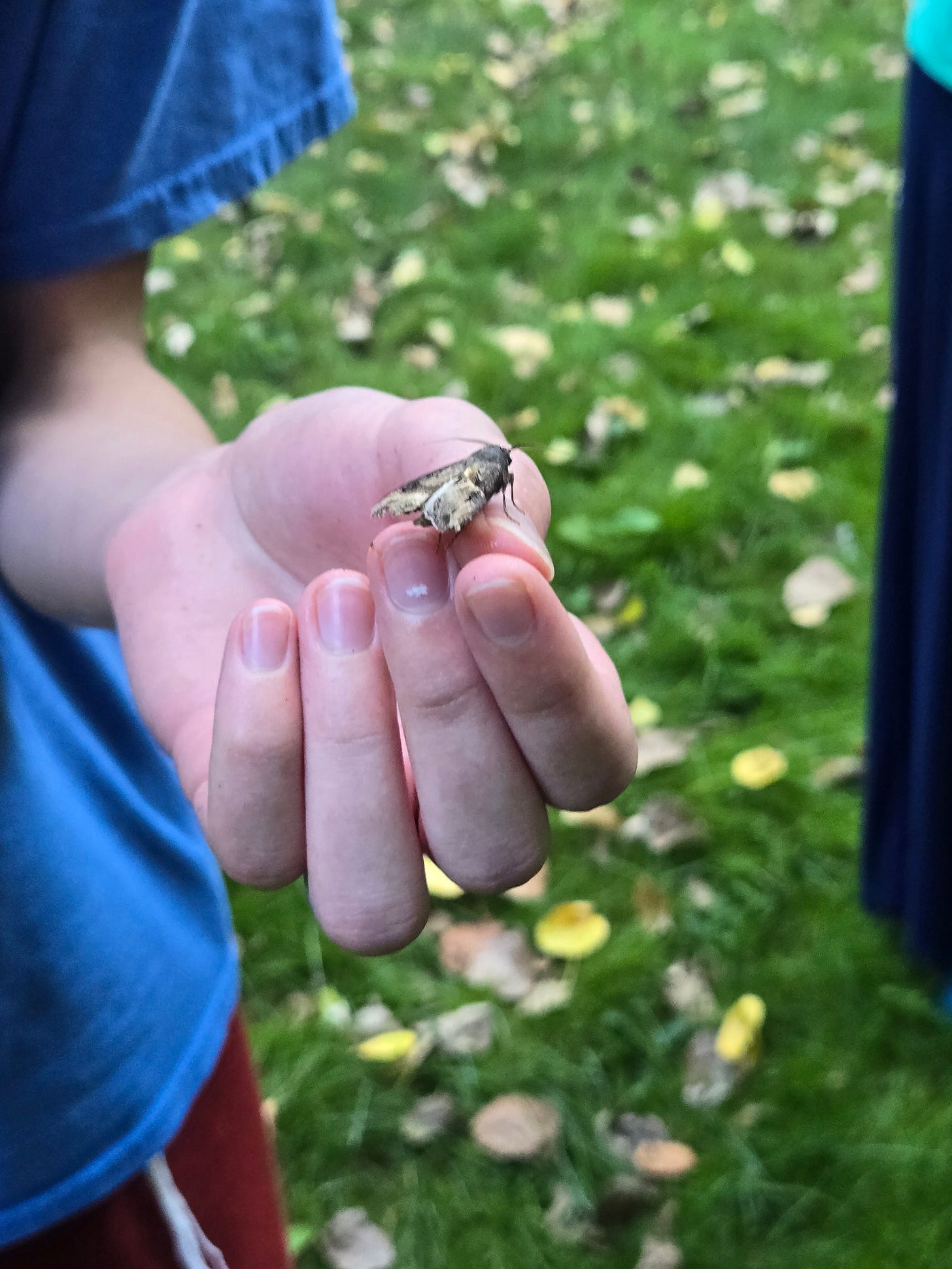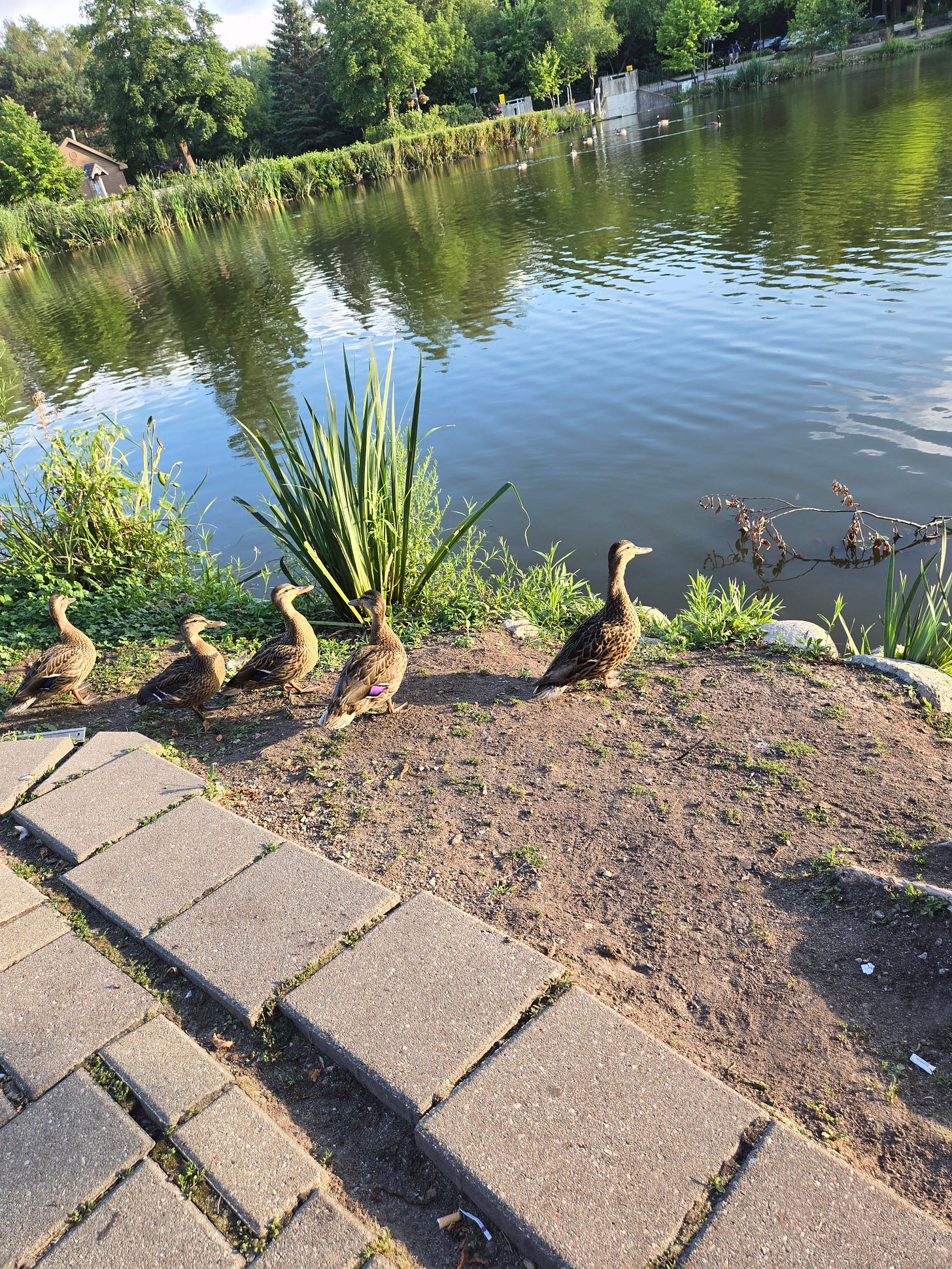We Can Live in Harmony in Nature
While this way of thought runs counter to the narrative of human domination, it is a necessary counterweight and condition to finding our true place on Earth—as Creatures of Cooperation.
“The earth lay rich and dark, and fell apart lightly under the points of their hoes. Sometimes they turned up a bit of brick, a splinter of wood. It was nothing. Some time, in some age, bodies of men and women had been buried there, houses had stood there, had fallen, and gone back into the earth. So would also their house, some time, return into the earth, their bodies also. Each had his turn at this earth. They worked on, moving together-together-producing the fruit of this earth-speechless in their movement together.”
—Pearl S. Buck, The Good Earth (1931). p. 26
“The friend of nature is the man who feels himself inwardly united with everything that lives in nature, who shares in the fate of all creatures, helps them when he can in their pain and need, and as far as possible avoids injuring or taking life.”
—Albert Schweitzer, Reverence for Life (1933)

Some humans feel a great amount of guilt for what our species have done to our Earth, to the millions of other species that we share the land and seas with. We want to help repair the damage, and while such intentions might be good, it is sometimes best to allow Nature to do her work of healing. It takes wisdom to know the difference.
Such wisdom is rare, and it only comes, it seems, with years of failure and mistakes. It is failure that leads to humility, a counterweight to hubris and arrogance. We can learn from failure when it opens the door to change and when it provides us instruction, but only if we have the right heart for it. A heart of humility that acknowledges and accepts that we humans are not masters of the Earth, but servants. Such is a big change in attitude for most of us, but a necessary one.
So, how should we respond? Is there some sort of rule or guidelines that we ought to use? There are; one such rule or guideline is that humans ought to offer assistance when it is human activity that causes the non-human species harm. Examples are when a bird is caught in a fishing line, especially those used to catch tons of marine life; or when a mammal crossing a road is hit by a car or truck, often driving too fast; or when a non-human animal ingests pesticides, which humans use indiscriminately, widely and without much thought of its deleterious effects. You get the idea, and I am sure you have your own examples of when humans ought to offer their assistance. These are not fixed; the rules and guidelines will change as we find out more about our human relationship to Nature. It is true that I like to err on the side of helping, of mutual aid, since I feel a kinship and a deep compassion for our furry and feathered friends.

Another rule to consider is that when we humans offer assistance, we do not do so with a haughty spirit—not that I would expect this from you readers—but with a spirit of humility and appreciation, acknowledging that you are providing a beneficial service by helping to restore the Earth to a rightful and necessary balance. Harmony is more than a word used in music; to be in harmony with Nature is for us humans to understand and appreciate our place and role, if you will, within Nature. This is an essential idea to any change in thinking and of behaviour that we can make. That humans operate within Nature, that whatever we do affects the Earth and its balance. We are not independent, but we are all interdependent—all species are connected, even if we do not think so or act as if we are. But we most certainly are deeply connected, which is called biophilia.1 Here are my thoughts from a recent Note, which acts as an anchor to this essay:
The more I commune with Nature, the more that I learn that the non-human world has much to teach us homo sapiens. It is best when we have a spirit of cooperation, of humility and of sharing, with each other and with all other species.
While some might think this is is a foolish sentimental notion that has no basis in reality, it is actually the opposite. Cruelty, dominance and human hubris has long been viewed as a constructed reality and, as such, is far away from the reality that all other species on Earth know and live by. We homo sapiens can also live by this code of conduct.
If we have yet to admit this, well, now is a good time to do so. And start to take the necessary steps to change. It is true that human change does not happen spontaneously; since homo sapiens have evolved to have a large brain, such pronounced change requires a change in thinking. Such a change is best described by a term from the 1960s, a paradigm shift.2 Change requires learning new ways of thinking and of being. It is also important and essential, I will add, for humans to know why the change to new ways is necessary. I and many others have written extensively on the reasons why, which can be boiled down to the idea that homo sapiens, modern humans, for the most part, have been a cooperative species; and when we do so it works out better for ourselves, for other species and for our Earth. The idea is well-discussed and argued in Mutual Aid: A Factor of Evolution (1902), by Pëtr “Peter” Kropotkin.3 It is in our interest to cooperate. There is growing evidence that spending time out in the natural world had beneficial health effects; we not only feel better, we are better.4
Since we have not earnestly learned about cooperation for so long, and we have not recently applied its ideas and principles, and have not sincerely practiced it at a great level, we need to both (re)learn it and teach it. Form new habits of thinking, of doing and of being. It will take time, but every journey begins with a first step. There is good news I can report. The central idea that humans are part of Nature is no longer so strange; it is gaining acceptance.

I will end here with a song that carries such a way forward, a song I first heard in the early 1970s at school, when I was a child in my early teens. Crosby, Stills and Nash (CSN) sing “Teach Your Children” in this 1970 performance. The song, recorded with the addition of Neil Young, is the second track of the album, Déjà Vu, which was released on March 11, 1970. We both learn and teach at the same time. Parents teach children. Children teach parents. It is circular and not linear. In the same way, carrying this idea of learning to another level, a much higher level, I would say, Nature teaches us humans. We humans cannot teach Nature anything, but we can listen and learn. And love Nature in return.
Don't you ever ask them why
If they told you, you would cry
So just look at them and sigh
And know they love you
Merci et à bientôt
Born at 315 ppm
Now at 425 ppm
Human Connection to Nature or Biophilia: Britannica: “Anecdotal and qualitative evidence suggests that humans are innately attracted to nature. For example, the appearance of the natural world, with its rich diversity of shapes, colours, and life, is universally appreciated. This appreciation is often invoked as evidence of biophilia. The symbolic use of nature in human language, in idioms such as “blind as a bat” and “eager beaver,” and the pervasiveness of spiritual reverence for animals and nature in human cultures worldwide are other sources of evidence for biophilia. Such spiritual experience and widespread affiliations with natural metaphors appear to be rooted in the evolutionary history of the human species, originating in eras when people lived in much closer contact with nature than most do today. Human divergence from the natural world appears to have occurred in parallel with technological developments, with advances in the 19th and 20th centuries having the most significant impact, fundamentally changing human interactions with nature. In its most literal sense, this separation was made possible by the construction of enclosed and relatively sterile spaces, from homes to workplaces to cars, in which modern humans were sheltered from the elements of nature and in which many, particularly people living in more-developed countries, now spend the majority of their time.”
Paradigm shift: Wikipedia: “A paradigm shift is a fundamental change in the basic concepts and experimental practices of a scientific discipline. It is a concept in the philosophy of science that was introduced and brought into the common lexicon by the American physicist and philosopher Thomas Kuhn. Even though Kuhn restricted the use of the term to the natural sciences, the concept of a paradigm shift has also been used in numerous non-scientific contexts to describe a profound change in a fundamental model or perception of events.
Kuhn presented his notion of a paradigm shift in his influential book The Structure of Scientific Revolutions (1962).”
Cooperation or Mutral aid: Mutual Aid: A Factor of Evolution (1902), Chapter 1: Mutual Aid Among Animals, by Pëtr “Peter” Kropotkin. “As soon as we study animals – not in laboratories and museums only, but in the forest and the prairie, in the steppe and the mountains – we at once perceive that though there is an immense amount of warfare and extermination going on amidst various species, and especially amidst various classes of animals, there is, at the same time, as much, or perhaps even more, of mutual support, mutual aid, and mutual defence amidst animals belonging to the same species or, at least, to the same society. Sociability is as much a law of nature as mutual struggle. Of course it would be extremely difficult to estimate, however roughly, the relative numerical importance of both these series of facts. But if we resort to an indirect test, and ask Nature: "Who are the fittest: those who are continually at war with each other, or those who support one another?" we at once see that those animals which acquire habits of mutual aid are undoubtedly the fittest. They have more chances to survive, and they attain, in their respective classes, the highest development of intelligence and bodily organization. If the numberless facts which can be brought forward to support this view are taken into account, we may safely say that mutual aid is as much a law of animal life as mutual struggle, but that, as a factor of evolution, it most probably has a far greater importance, inasmuch as it favours the development of such habits and characters as insure the maintenance and further development of the species, together with the greatest amount of welfare and enjoyment of life for the individual, with the least waste of energy.”
Eudaimonic well-being: APA: Nurtured by Nature (2020): “Whatever you call it, connectedness to nature seems to benefit mood and mental health. In a meta-analysis, Alison Pritchard, PhD, ABPP, at the University of Derby in England, and colleagues found that people who feel more connected to nature have greater eudaimonic well-being—a type of contentment that goes beyond just feeling good and includes having meaningful purpose in life (Journal of Happiness Studies, online first publication, 2019).”




🙃🙃🙃🤗🤗🤗😘😘😘😍😍😍🥰🥰🥰
Thanks Perry.
Harmony. Nature. The seasons. The cycles. The invisible yet palpable energy that connects us all.
I stood at Hawk cliff this week for 2 hours and got lost in the music. 150 Kestrel Falcons, a few broad wing hawks, 10 Harriers, ospreys, massive flocks of blue jays all flew over. Hugging the lake shore. Knowing its time. To head for warmth.
Don't you ever ask them why
If they told you, you would cry
So just look at them and sigh
And know they love you
Bless you